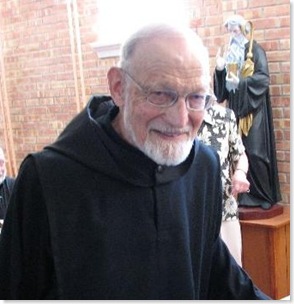In the first whisper of morning light I watched a 20 foot cedar move its slow movement outside the sitting room window at St Peter’s Abbey. A picture of a child running through tall grass by the edge of town moved in my mind. Later in the day I would walk the silent monastery halls, arm in arm with Father James, his 82 year old frame a little more bent, his step slightly slower, and he would say with that smiling voice, that he’s had enough birthdays. For most of his live he’s been a monk in community, and a hermit–so he knows how to let go.
 But how do I let him go? How do I let anything go? Or, is this the monastic journey?
But how do I let him go? How do I let anything go? Or, is this the monastic journey?
The evening before, over tea and raisin cookies, we talked, as we always did, about God, mindfulness, failings, innocence, history, loss, promise, personality, church… I’m not a great conversationalist, but in the presence of Fr. James I always feel elevated and connected through the simple give and take of words.
We talked about poetry too. On the drive to St. Peter’s Deb and I had stopped in Saskatoon. We took an unplanned detour and came across a used book store. I bought a book of Rilke poems. I didn’t know about the Duino Elegies–Rilke’s last work. I showed Father James my book, he laughed and said he was reading the same book.
How do you sustain the picture? The picture of the innocent child running through tall grass and feeling as though she was entirely in God and God was entirely in her? How do you sustain a shot of heart-gladness that makes you feel as though death is behind you? That makes you feel a depth of forgiveness that precludes any sense you needed forgiving. Is this too the (monastic) journey? The letting go of the picture so that it can return again…the perpetual letting go, so as perhaps to enable it’s infinite return?

I think letting go – moving toward death until it is behind us, is exactly the monastic journey, or any true spiritual journey. Fr. Adrian VanKaam lived that out until he was only left with his smile – and he said that his ministry was exactly that – the ministry of a smile. If only we could know the mystery that we are – without all the adornment we cling to.